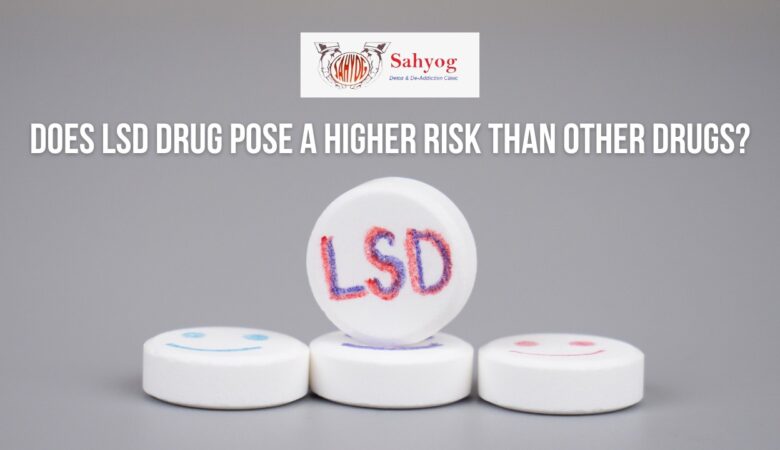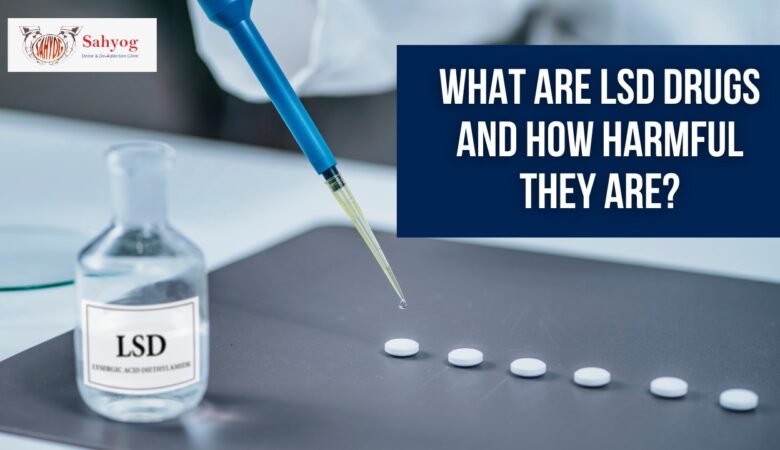Does LSD Drug pose a higher risk than other drugs?
LSD, or lysergic acid diethylamide, is a powerful hallucinogenic drug that has been used for decades, both recreationally and in therapy. It is considered by many to be one of the safest drugs available, with a very low risk of overdose or serious side effects. However, there is some evidence that LSD drugs may pose a higher risk than other drugs, particularly when it comes to mental health. In this blog post, we will explore the risks associated with LSD drug use and whether or not they outweigh the benefits. What is an LSD drug? Lysergic acid diethylamide (LSD) is a powerful psychedelic drug that can produce intense visual hallucinations and alter a person’s perception of reality. LSD drug is one of the strongest mood-changing chemicals known to man, and its effects can last up to 12 hours. The drug is usually sold as a liquid, but it can also be found in tablet or capsule form. Users of LSD drugs may see colors and patterns that are not there, feel intense emotions, and have hallucinations. LSD drugs can also cause changes in awareness of time and space. The History of LSD drug Lysergic acid diethylamide, also known as LSD or “acid“, is a semisynthetic psychedelic drug of the lysergamide family. It is one of the most potent, research-backed psychedelics; indoors, a single dose of LSD can produce profound changes in consciousness. LSD was first synthesized by Swiss chemist Albert Hofmann in 1938 from ergotamine, a chemical derived from the fungus Claviceps purpurea. Hofmann was investigating medicinal uses of ergot and accidentally ingested an active compound while synthesizing LSD. His experience was described in his autobiography as ‘experiencing a peculiar restlessness’, and that this feeling was accompanied with ‘mild euphoria’. He furthermore clarified that the drug induced ‘pleasant dreams of fantastic pictures’ that were clearly flashed through his mind. Hofmann’s initial discovery led to further studies on LSD’s effects on humans. In 1947, he conducted the first controlled experiment on humans, giving himself and four other volunteers 250 micrograms (µg) each of LSD. The results were published in 1948 in the Zeitschrift für ethnologie Journal. How does LSD drug work? A powerful psychedelic drug, LSD can produce extreme changes in perception and consciousness. It works by attaching itself to the serotonin receptors present in the brain. Serotonin is a neurotransmitter that plays a role in mood, cognition, and perception. When LSD binds to serotonin receptors, it alters the normal functioning of the neurotransmitter and produces the intense effects experienced by users. LSD drugs act on a range of brain regions, including those involved in sensory processing, emotional regulation, and higher-level cognition. This is why the effects of LSD drugs are so unpredictable and can range from pleasant to unpleasant. It’s also why LSD drugs are considered a potent psychotherapy tool: they can temporarily induce changes in brain function and help people explore different aspects of their personality and consciousness. The risks of using LSD drug LSD is one of the most potent and well-known psychedelics and has been used by millions of people around the world. Although it is not considered to be addictive, LSD can produce tolerance, and users may develop a dependency on the drug. LSD drug is typically taken orally, although it can also be injected or inhaled. The effects of the drug usually begin within 30 to 60 minutes after ingestion, peak at about 2 to 4 hours, and then gradually dissipate. However, the effects of LSD drugs can last for 8 hours or longer. Short-term effects of LSD drugs include: Visual hallucinations (Imagining things that do not exist and visualizing them) Auditory hallucinations (Imagining hearing voices that actually do not exist) Changes in perception of time and space (Failing to recognize and understand the change in time and space) Heightened feelings and sensory experiences (Increased awareness of senses; being hyper aware of how one feels) Intensification of emotions (Feeling too much, all at once) Altered state of consciousness (Temporary change in one’s normal mental state) Nausea (Uneasiness of the stomach; may lead to under-eating or not being able to eat properly, causing eating disorders) Tachycardia (Increased heart rate due to undergoing medication of LSD) However, LSD drugs also carry many risks. These risks include: Dysphoria: Dysphoria is a state of uneasiness and dissatisfaction with life. LSD drug intake may cause the person to feel dysphoric. Anxiety: Adverse effects of LSD include anxiety as well, as a person may start to feel overwhelming anxiety due to the changes in his behavior and perception. Troubling illusions: One may start to hallucinate by intake of LSD drugs, and may be prone to troubling illusions. Hyper awareness of one’s physiological processes: LSD drug is a very strong drug. It can make a person hyper aware of his/her physiological processes, leading to panic and anxiety. Impaired judgment: Usage of LSD drugs also leads to impaired judgment. A person under LSD drug medication may not be able to make accurate decisions. Accumulation of platelets: Overdose of LSD drugs may increase the accumulation of platelets, leading to arterial thrombosis. Arterial thrombosis refers to a blood clot in the artery, leading to major problems such as angina, heart attack, etc. due to the obstruction of the flow of blood to the major organs. Coronary artery spasms: Similar to arterial thrombosis, coronary artery spasms are conditions where the walls of arteries are contracted, blocking the flow of blood to the major organs. Infections: Complications may occur due to LSD drug intoxication, and may lead to toxicity and infections. Potential death due to overdose: While LSD drug has its benefits, it may pose a threat to your life due to potential overdose. Are there any benefits to taking LSD? Lysergic acid diethylamide has been used recreationally since the 1950s. Unlike other drugs, LSD does not seem to pose a higher risk of addiction or dependence. Since it works by binding to serotonin receptors in the brain, hence, it also helps in controlling mood, behavior,


